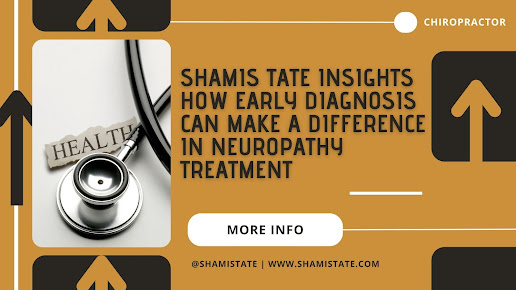Early diagnosis is crucial when it comes to neuropathy, a condition that can lead to debilitating symptoms if left untreated. In this blog, Shamis Tate, an expert in neuropathy care, discusses how recognizing the signs of neuropathy early can impact treatment outcomes, slow disease progression, and improve quality of life. We’ll explore the importance of early intervention, the role of diagnostic testing, and what patients can do to manage symptoms effectively. Learn how taking action now can make all the difference.
The Importance of Recognizing Early Symptoms
Neuropathy often begins with subtle symptoms—like mild tingling or occasional numbness—that can easily be overlooked or dismissed as temporary discomfort. Shamis Tate emphasizes that paying attention to these early warning signs is essential. Delaying medical consultation can lead to the progression of symptoms, making them harder to manage over time. Recognizing the early stages allows individuals to seek medical attention before nerve damage becomes irreversible.
Diagnostic Testing: Pinpointing the Problem
Early diagnosis involves a series of diagnostic tests that help pinpoint the cause and extent of neuropathy. She explains that tests like nerve conduction studies, blood tests, and imaging can identify the specific nerves affected and the underlying health issues contributing to neuropathy. When diagnosed early, doctors have a clearer picture of the condition, allowing for more targeted and effective treatment plans.
Early Treatment Options: Slowing Disease Progression
Once neuropathy is diagnosed, early treatment options can make a substantial difference. Shamis Tate points out that therapies like medication, physical therapy, and lifestyle changes can slow the disease's progression. In some cases, treating the underlying cause—such as diabetes or vitamin deficiencies—can prevent further nerve damage. The sooner treatment begins, the greater the chances of avoiding severe complications and preserving nerve function.
Improving Quality of Life Through Early Intervention
One of the most significant advantages of early diagnosis is maintaining a higher quality of life. She highlights that patients who start treatment early often experience less pain, better mobility, and a reduced risk of complications. Early intervention also allows individuals to make necessary lifestyle adjustments, such as adopting a healthier diet, exercising, and managing underlying conditions, all of which contribute to long-term well-being.
Shamis Tate's Advice for Patients: Take Action Now
Shamis Tate advises that taking proactive steps toward early diagnosis can greatly impact your future health. Regular check-ups, being mindful of your symptoms, and seeking a specialist’s help when something feels off can make all the difference in your neuropathy journey. Tate underscores the importance of not ignoring even minor symptoms, as early action is often the key to slowing the progression of neuropathy and improving treatment outcomes.

Comments
Post a Comment